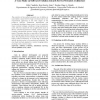Free Online Productivity Tools
i2Speak
i2Symbol
i2OCR
iTex2Img
iWeb2Print
iWeb2Shot
i2Type
iPdf2Split
iPdf2Merge
i2Bopomofo
i2Arabic
i2Style
i2Image
i2PDF
iLatex2Rtf
Sci2ools
132
click to vote
AINA
2008
IEEE
2008
IEEE
A Case Study on Software Evolution towards Service-Oriented Architecture
The evolution of any software product over its lifetime is unavoidable, caused both by bugs to be fixed and by new requirements appearing in the later stages of the product's lifecycle. Traditional development and architecture paradigms have proven to be not suited for these continual changes, resulting in large maintenance costs. This has caused the rise of approaches such as Service Oriented Architectures (SOA), based on loosely coupled, interoperable services, aiming to address these issues. This paper describes a case study of the evolution of an existing legacy system towards a more maintainable SOA. The proposed process includes the recovery of the legacy system architecture, as a first step to define the specific evolution plan to be executed and validated. The case study has been applied to a medical imaging system, evolving it into a service model.
Related Content
| Added | 18 Oct 2010 |
| Updated | 18 Oct 2010 |
| Type | Conference |
| Year | 2008 |
| Where | AINA |
| Authors | Félix Cuadrado, Boni García, Juan C. Dueñas, Hugo A. Parada G. |
Comments (0)

